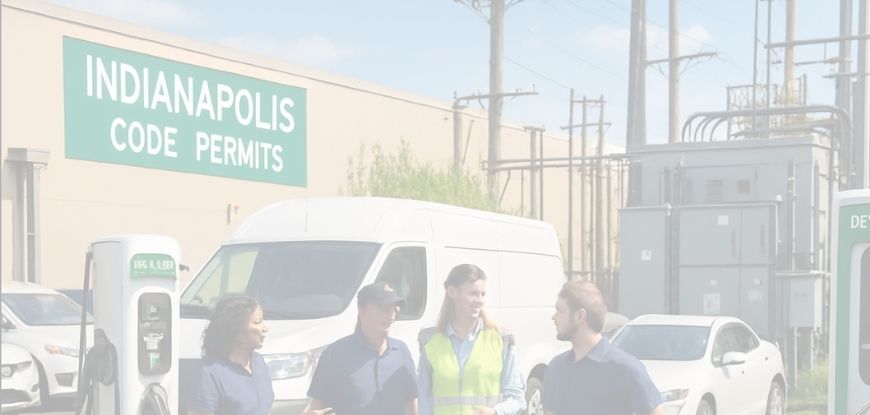EV charger installation is more complex than simply plugging into a wall outlet. Level 2 chargers typically require a 240V circuit, which may involve upgrading your home’s electrical panel, installing a new circuit breaker, or even running conduit to your garage or driveway.
A licensed electrician ensures:
- The system won’t overload your electrical panel
- Proper wiring and grounding for safety and reliability
- Compliance with Indianapolis and Indiana electrical codes
- Eligibility for local permits and utility rebates
Improper installation can void warranties, lead to electrical hazards, or cost more in repairs and code violations later on.
What to Look for in an Indianapolis EV Charger Electrician
1. Licensed and Insured in Indiana
Always verify that your electrician holds an active electrical contractor’s license in Indiana. They should also carry liability insurance and workers’ compensation coverage to protect your home and their crew in the event of an accident.
2. Experience with EV Charger Installation
Ask whether the electrician has specific experience with EV chargers, especially for your car brand. Tesla Wall Connectors, for example, have unique installation requirements compared to generic Level 2 chargers. An experienced installer will know the nuances, like proper amperage, breaker sizing, and mounting considerations.
3. Familiarity with Local Permits and Codes
Indianapolis has its own permitting requirements for electrical work. A qualified local electrician will be familiar with these and handle the paperwork for you. This ensures you pass inspection and meet all safety regulations without the hassle.
4. Panel Upgrade Services
Older Indianapolis homes may have electrical panels that can’t support the added load of a Level 2 charger. A skilled electrician will evaluate your panel and offer upgrade solutions if needed. This is especially important in historic neighborhoods or homes with 100-amp panels.
5. Strong Customer Reviews
Check Google, Yelp, or Better Business Bureau ratings for honest reviews of the electrician’s work. Look for consistent feedback on professionalism, timeliness, clean installation, and communication. A trustworthy electrician should also be willing to provide references upon request.
Questions to Ask Before Hiring
To ensure you’re choosing the best electrician for your EV charger installation in Indianapolis, ask the following:
- Are you licensed and insured in the state of Indiana?
- How many EV charger installations have you completed?
- Do you handle permits and inspections?
- Will you perform a load calculation to evaluate my home’s capacity?
- Can you help with panel upgrades if necessary?
- Do you offer a warranty on the installation work?
A reputable contractor will have no issue answering these questions and offering transparent quotes.
Why Hire Local in Indianapolis?
Hiring a local electrician offers several benefits beyond convenience:
- Knowledge of Indianapolis-specific codes ensures your installation is 100% compliant.
- Faster service times—local electricians can often complete the job within days instead of weeks.
- Support for local businesses helps keep skilled tradespeople employed in your community.
- Better follow-up support—if there are any post-installation issues, you have someone close by to assist.
Whether you live in downtown Indy, Carmel, Broad Ripple, or Greenwood, a local electrician is more likely to understand your neighborhood’s infrastructure, permitting nuances, and utility rebates.
Invest in Professional EV Charger Installation: It Will Pay off
With more EVs hitting the roads in Indianapolis, at-home charging is quickly becoming the norm. But a safe, efficient, and future-proof installation starts with hiring the right electrician. From evaluating your panel to pulling permits and setting up your charger, the process requires more than just basic wiring—it demands expertise.
Choose a licensed, experienced, and locally trusted electrician to make sure your charger installation is done right the first time. It’s not just about powering your car—it’s about protecting your home and maximizing your investment in electric driving.

.jpg)

.jpg)
SHARE